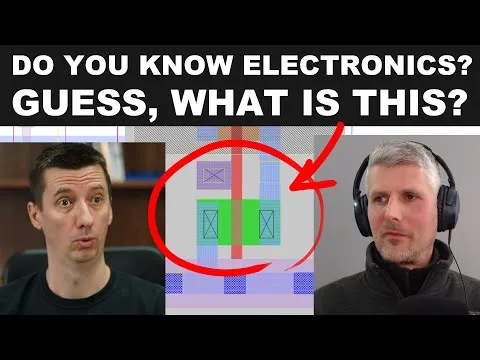
Essentials of Advanced Radio Frequency IC Design 
Unlock the insights of the RF world in the "Essentials of Advanced Radio Frequency IC Design" course. Learn about RF parameters, circuit analysis, IC fabrication, CMOS in RF design, and RF power amplifier architectures. Enhance your knowledge of Radio Frequency Design, a valuable skill for careers in top wireless and telecommunication companies. Dive into this captivating course and expand your RF expertise! Get a comprehesive understanding of this course which is a cost course. AZ Class provides this course data for free. Learn more certificate and details here. ▼
ADVERTISEMENT
Course Feature
![]() Cost:
Cost:
Paid
![]() Provider:
Provider:
Udemy
![]() Certificate:
Certificate:
Paid Certification
![]() Language:
Language:
English
![]() Start Date:
Start Date:
2015-02-02
Course Overview
❗The content presented here is sourced directly from Udemy platform. For comprehensive course details, including enrollment information, simply click on the 'Go to class' link on our website.
Updated in [October 18th, 2023]
What does this course tell? (Please note that the following overview content is from the original platform) In this course you will see the insights of the RF World! Lets briefly summarize what all you will learn in this course We will start off with the Introduction to Radio Frequency and Integrated Circuits at wireless( RF) frequencies We will also discuss the applications of RFICs at a system level You will initially learn about various RF parameters like S- parameters VSWR Reflection Coefficient etc and also understand the analysis of RF circuits and transmission lines using Smith Charts and Equations Alongside we will also teach you about some fundamentals like impedance matching and power measurement in decibels We will then glance through the captivating Integrated Circuit Fabrication process and the various steps materials and techniques involved in IC Fabrication You will also learn about Foundries and PDKs and why they are important We will briefly look at the concept of VLSI Technology and how VLSI is associated with RFIC designing Later we will see the basics of CMOS and how CMOS is used in RF Design Finally you will learn about some interesting circuit designs like the RF Power Amplifier (PA) and the various RF power amplifier architectures and topologies This course will enhance your knowledge about Radio Frequency Design which is applied in most of the jobs available in top Wireless and Telecommunication based companies designing wireless products We hope you enjoy this course!!! We considered the value of this course from many aspects, and finally summarized it for you from two aspects: skills and knowledge, and the people who benefit from it: (Please note that our content is optimized through artificial intelligence tools and carefully reviewed by our editorial staff.) What skills and knowledge will you acquire during this course? During this course, the learner will acquire the following skills and knowledge: 1. Understanding of Radio Frequency (RF) and Integrated Circuits (ICs) at wireless frequencies. 2. Knowledge of the applications of RFICs at a system level. 3. Familiarity with various RF parameters such as S-parameters, VSWR, and Reflection Coefficient. 4. Ability to analyze RF circuits and transmission lines using Smith Charts and Equations. 5. Understanding of impedance matching and power measurement in decibels. 6. Knowledge of the Integrated Circuit Fabrication process, including the steps, materials, and techniques involved. 7. Understanding of Foundries and Process Design Kits (PDKs) and their importance. 8. Familiarity with VLSI Technology and its association with RFIC designing. 9. Basics of CMOS and its use in RF Design. 10. Knowledge of circuit designs such as RF Power Amplifiers (PAs) and various RF power amplifier architectures and topologies. Overall, this course will enhance the learner's knowledge of Radio Frequency Design, which is applicable in various job roles in top Wireless and Telecommunication companies involved in designing wireless products. Who will benefit from this course? This course on Essentials of Advanced Radio Frequency IC Design will benefit individuals interested in or working in the field of wireless and telecommunication. Specifically, professionals in the following roles will benefit from this course: 1. RF Engineers: RF engineers who design and develop wireless products will gain valuable insights into RFIC design, including understanding RF parameters, analysis of RF circuits, and transmission lines using Smith Charts and Equations. They will also learn about impedance matching and power measurement in decibels, which are essential skills in RF design. 2. System Engineers: System engineers involved in the design and integration of RFICs at a system level will benefit from this course. They will gain knowledge about the applications of RFICs in wireless systems and understand how RFICs fit into the overall system architecture. 3. IC Designers: IC designers looking to specialize in RFIC design will find this course beneficial. They will learn about the integrated circuit fabrication process, including the steps, materials, and techniques involved. Additionally, they will gain an understanding of VLSI technology and its association with RFIC design. 4. Wireless Product Designers: Professionals involved in designing wireless products, such as mobile phones, routers, and IoT devices, will benefit from this course. They will learn about RF power amplifier architectures and topologies, which are crucial for designing efficient and high-performance wireless products. Overall, this course will enhance the knowledge and skills of individuals working in the wireless and telecommunication industry, enabling them to excel in their respective roles and contribute to the design of cutting-edge wireless products.
Course Syllabus
About Us
Introduction to RF
RF Basics
Radio Frequency Parameters
VLSI and IC Design
RF IC Fabrication and Foundries
CMOS and RF Design using CMOS
Power Amplifier (PA) Design
Low Noise Amplifiers
Course Provider

Provider Udemy's Stats at AZClass
Discussion and Reviews
0.0 (Based on 0 reviews)
Explore Similar Online Courses

Warehouse Management in Logistics & Supply Chain Management

How To Rap For Beginners

Python for Informatics: Exploring Information

Social Network Analysis

Introduction to Systematic Review and Meta-Analysis

The Analytics Edge

DCO042 - Python For Informatics

Causal Diagrams: Draw Your Assumptions Before Your Conclusions

Whole genome sequencing of bacterial genomes - tools and applications

How to Design Your Own Chip And How to Build it For Free (It Is Possible) - with Matt Venn

HWN - "20-year Analog IC Designer" vs Our Team (Interview Question)


Start your review of Essentials of Advanced Radio Frequency IC Design